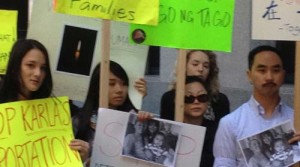Should ‘TNTs’ start planning for voluntary departure from US?
More than 11 million unauthorized immigrants in the United States, including approximately 300,000 from the Philippines, are now in panic mode and uncertain about their future under a Trump administration. Deporting immigrants who are in unlawful status is one of Trump’s campaign promises.
The presidential election result was a bitter pill to swallow for most immigrants. Most of the Filipino American immigrants in the San Francisco Bay Area are not happy with the result of the election. Immigration attorneys have received many phone calls and emails from concerned immigrants, both legal as well as those who are undocumented, asking about the immediate threat of removal from the US come January 20, 2017.
Lawful permanent residents or those with status are seriously concerned about pending petitions for their family members. Will the petitioning process take longer with the coming Trump administration? Those who are in possession of professional working visas are worried about whether the H1B program will be eliminated. Filipino healthcare workers such as registered nurses, physical therapists and caregivers with pending immigrant petitions from US employers have no clue on whether their visas are still going to be issued if immigration policy changes.
The most vulnerable immigrants who are most likely going to be affected are the DREAMERS (children who were supposed to benefit from the Development, Relief and Education of Alien Minors or the DREAM Act) and the DACA (Deferred Action for Childhood Arrivals) recipients. These are the young immigrants who came to the United States when they were below 15 years old and who are still present in the US as young adults without legal status.
For the last eight years, President Obama has supported a DREAM Act that allows these young immigrants to have lawful status, but the bill failed to pass in Congress. Using his executive power, he released a program called the DACA where thousands of young immigrants were given temporary employment authorization cards to allow them to live without fear of deportation and enabling them to work temporarily. Thousands of young Filipinos availed of this program. Their names and information are in the current system of the Department of Homeland Security. They fear not just losing their DACA status, but also about their parents who may be subject to removal.
After listening to the interview of President-Elect Donald Trump on “60 Minutes,” it appears that he also has priorities for dealing with immigration. He explicitly mentioned the immediate deportation of three million undocumented immigrants. Also, he confirmed that border security would be tightened and then removal of undocumented with criminal records would be next. Prioritizing border security is paramount on his agenda as may be assumed from his campaign plan of building a wall in the US-Mexico border.
If Trump follows through with his public statements, those who are in unlawful presence or TNTs including the DACA recipients are not (yet) in danger of immediate deportation. While there is no immediate threat at the moment, they have to be mindful of their activities, be familiar about their rights and keep in their immediate possession whatever legal documents relating to their immigration history in this country.
Most importantly, this vulnerable population must be able to distinguish between real and fake news on immigration. At the present time, it is easy to fall victim to false information on social media because bigotry and hatred are on the rise against minorities and immigrants. Be very vigilant.
(Atty. Lourdes Santos Tancinco is a San Francisco based immigration attorney and immigrant advocate. She may be reached at law@tancinco.com, 1 888 930 0808 or visit her at tancincolaw/facebook.com or www.tancinco.com)
